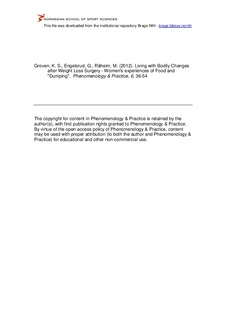| dc.contributor.author | Groven, Karen Synne | |
| dc.contributor.author | Engelsrud, Gunn | |
| dc.contributor.author | Råheim, Målfrid | |
| dc.date.accessioned | 2012-10-10T10:55:25Z | |
| dc.date.available | 2012-10-10T10:55:25Z | |
| dc.date.issued | 2012 | |
| dc.identifier | Seksjon for kroppsøving og pedagogikk / Department of physical education | |
| dc.identifier.citation | Phenomenology & Practice. 2012, 6(1), 36-54 | no_NO |
| dc.identifier.issn | 1913-4711 | |
| dc.identifier.uri | http://hdl.handle.net/11250/170974 | |
| dc.description | The copyright for content in Phenomenology & Practice is retained by the author(s), with first publication rights granted to Phenomenology & Practice. By virtue of the open access policy of Phenomenology & Practice, content may be used with proper attribution (to both the author and Phenomenology & Practice) for educational and other non-commercial use. | no_NO |
| dc.description.abstract | In this article we explore women’s experiences of “dumping” following weight loss surgery. The empirical material is based on individual interviews with 22 Norwegian women. To further analyze their experiences, we build primarily on the phenomenologist Drew Leder`s notion of the “inner body.” Additionally, Simone de Beauvoir and Merleau-Ponty’s perspectives of the lived body occupy a prime framework for shedding light on different dimensions of bodily changes. The following three core themes were identified: Experiences of illness in conjunction with eating; Learning to relate to changes in the inner body and; Feelings of losing and regaining control. In different, though interconnected ways, these themes encompass an ongoing challenge in the women’s lives after the surgery: namely their efforts to establish new eating habits while at the same time working hard to relate to their changed and changing inner body, and especially to the phenomenon of “dumping”. The results points to a dilemma: namely that the gastric bypass procedure is an operation that irreversibly alters the anatomy and physiology of a healthy stomach, whereas the individual’s eating habits cannot be situated in or reduced to a particular organ, but are endemic to the lived body and its history. This insight might be of importance in the understanding of the complexity of the changes and challenges the women go through after weight loss surgery. | no_NO |
| dc.language.iso | eng | no_NO |
| dc.publisher | Thompson Rivers University | no_NO |
| dc.title | Living with bodily changes after weight loss surgery - women's experiences of food and "dumping" | no_NO |
| dc.type | Journal article | no_NO |
| dc.type | Peer reviewed | no_NO |
| dc.subject.nsi | VDP::Humanities: 000::Architecture and design: 140 | no_NO |
| dc.subject.nsi | VDP::Social science: 200::Psychology: 260 | no_NO |
| dc.subject.nsi | VDP::Social science: 200::Education: 280 | no_NO |
| dc.subject.nsi | VDP::Social science: 200::Social work: 360 | no_NO |
| dc.subject.nsi | VDP::Medical disciplines: 700::Health sciences: 800 | no_NO |
| dc.source.pagenumber | 36-54 | no_NO |
| dc.source.volume | 6 | no_NO |
| dc.source.journal | Phenomenology & Practice | no_NO |
| dc.source.issue | 1 | no_NO |
